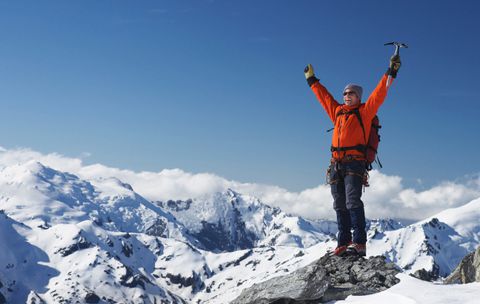(单词翻译:单击)
As if climbing a mountain wasn’t hard enough already,
仿佛爬山难度还不够大一样,
forcing the body to acclimate to high altitudes too quickly can not only stop someone from reaching the summit, it can have dire consequences.
人们开始强迫身体快速适应高海拔环境,但这样做不仅能妨碍人们登顶,还可能带来可怕的后果。
But altitude sickness doesn’t just affect adrenaline-driven mountaineers.
然而,高原反应不仅仅会影响那些因为一时兴起而登山的登山者。
The effects of altitude sickness can be experienced at as low as 1,800 meters, only about a third of the way up to Everest Base Camp.
实际上,在海拔低至1800米低的地方,也即珠峰大本营海拔三分之一的地方都可能出现高反。
Oh and just because someone is young and physically fit, doesn’t mean that they won’t get sick.
哦,还有,一个人年轻且身体健康并不代表他就不会得高反。
Youth is no protection. Fitness is no protection. It doesn't work that way.
青春并不是保护伞。健康也不是。我们就不能这么看高反问题。
My name is Jan Stepanek.
我是Jan Stepanek。
I've been at Mayo Clinic for the last 25 years, I'm an internal medicine and aerospace medicine specialist.
过去25年我一直在梅约医学中心工作,我是一名内科专家兼航天医学专家。
The biggest difference between low altitudes, like sea level, and high altitudes, like a mountain, is actually not a lack of oxygen, it’s the change in atmospheric pressure.
低海拔地区,比如海边,和高海拔地区,比如高山,最大的区别其实不是缺不缺氧,而是大气压力的变化。
We all think of oxygen merely in terms of, you know, what is around us. 21% of the ambient air that we breathe is oxygen.
我们大家对氧气的理解就是我们身边的空气中氧气的含量是21%。
That percentage doesn't change between sea level and Mount Everest.
无论是海边,还是珠峰上,这个比例都是不变的。
The only thing that changes is the pressure that surrounds us.
唯一变化的是我们周围的压力。
It’s this pressure that drives the gas exchange from the lungs into the red blood cells which carry oxygen to the rest of the body.
正是这种压力帮助我们完成了肺部和红细胞之间的氧气交换,红细胞再将氧气输送到我们身体的其他部位。
So less pressure at a high altitude means it’s harder for the body to take up the oxygen.
所以,在空气压力较小的高海拔地区,身体吸收氧气会更困难。
But. Our bodies are amazing.
但我们的身体是很了不起的。
The body can adapt to the lack of ambient pressure at high altitude by breathing faster and elevating the heart rate.
它可以通过加快呼吸和提高心率来适应高空环境压力的缺失。
By blowing off more carbon dioxide, the lungs are able to enrich the blood with more oxygen.
我们的肺可以通过呼出更多的二氧化碳增加给血液提供的氧气含量。
It's called sympathoadrenal drive, so your heart rate and your cardiac output goes up
这就是所谓的“交感肾上腺驱动”,所以你的心率和心排出量会上升,
and that allows your body to gradually reset to that new altitude environment of decreased ambient pressure and you still continue to function well without falling ill.
这样一来,你的身体就能逐渐适应环境气压变小了的新海拔环境,从而保证你身体机能的正常运行而不至于生病。
This all happens seamlessly if you ascend to a high altitude slowly.
如果你是慢慢地在往高海拔过渡的话,这一切都能无缝地顺畅发生。
It’s when you jump from low to high too quickly that the body struggles with the change.
只有当你很快地从低海拔跨越到高海拔地区时,你的身体才会很难适应气压变化。
This causes the first type of altitude sickness you’d experience called acute mountain sickness
这就会引起第一种高原反应,也即“急性高反”,
with symptoms of headache, lack of appetite, nausea, vomiting, fatigue, light-headedness, and disturbed sleep.
相关症状包括头痛、食欲不振、恶心、呕吐、疲劳、头晕和睡眠紊乱等。
But if you breathe too fast, you can start to lower your carbon dioxide levels and there is a balance.
但如果你呼吸太快,你体内的二氧化碳水平就会偏低,而人体的氧气和二氧化碳水平是需要达到一个平衡的。
You know, you need normal oxygen and carbon dioxide levels in order to function optimally.
只有在常规的氧气水平和常规的二氧化碳水平下,你的身体机能才能呈现出最好的状态。

And it’s these low carbon dioxide levels that can start to cause problems.
所以,低二氧化碳就可能引发一系列的问题。
The carbon dioxide we all think of as being a waste gas.
在我们眼里,二氧化碳就是一种废气。
But we actually need certain levels of carbon dioxide to maintain normal blood flow to regions of the brain.
但事实上,要维持大脑区域的正常血液流动就离不开一定量的二氧化碳。
So if carbon dioxide levels drop too much, blood flow to the brain starts to diminish.
所以,如果二氧化碳浓度下降太厉害,流向大脑的血液就会开始减少。
The changes in oxygen levels and result in changes of breathing can cause the more dangerous forms of high altitude illnesses, HACE and HAPE.
氧气水平的变化和呼吸的变化可能导致更危险的高反病,高原脑水肿(HACE)和高原肺水肿(HAPE)。
We believe today, based on the pathophysiology, that from acute mountain sickness,
根据病理生理学,我们现在认为,得了急性高反之后,
and if not paid attention to and people do the foolish thing and continue to ascend despite being sick,
还不予以重视,做出一些愚蠢的行为,不要命地继续往海拔更高的地方走的话,
then you can progress to high altitude cerebral edema,
就可能发展成高原脑水肿,
which not infrequently goes hand-in-hand with a little bit of pulmonary edema.
而高原脑水肿经常都会伴随轻微的肺水肿出现。
These two edema illnesses are rare and can be difficult to study because they often occur in high, hard to reach places
这两种水肿很少见,也很难研究,因为它们经常都发生在海拔较高又难以到达的地方,
where the person either rapidly descends and their symptoms ease or they progress and cause death.
这时,患者快速下到低海拔地区,症状就能得到缓解,要是继续往上爬,就会丧命。
In high-altitude cerebral edema, experts think that the changes in blood flow
就高原脑水肿而言,专家认为,血流的变化会导致
causes an increase in the permeability of the blood-brain barrier causing brain fluid to leak around the blood vessels.
血脑屏障通透性增加,继而引起脑液在血管周围渗漏。
This causes the brain to swell and starts to hinder the central function of the brain stem and other critical areas of the brain.
脑液的渗漏会引起大脑肿胀,并开始阻碍脑干和大脑其他关键区域的中枢功能。
But what exactly causes the blood-brain barrier to leak?
但引起血脑屏障渗漏的因素究竟是什么呢?
Million dollar question. You know, there is a lot of hypotheses.
这个问题就太值钱了。围绕这个问题人们做了很多假设。
Similarly with high-altitude pulmonary edema, blood vessels constrict in the lungs in a patchy fashion in response to lack of oxygen.
和高原肺水肿一样,缺氧之后,肺部血管会以一种不均匀的方式收缩。
This can cause the vessels to leak in a manner similar to the blood-brain barrier resulting in pulmonary edema.
收缩可能导致血管以类似肺水肿出现的血脑屏障渗漏的方式渗漏。
And keep in mind, this is in an environment where you already have lack of oxygen due to ambient pressure,
记住了,这时,你已经身处在缺氧环境了,
so it gets to a point where it just gets to be not enough for the body to be able to function and systems start shutting down,
所以,问题就会发展到怎么着身体都无法获取正常工作所需的氧气量的地步,身体机能就会开始崩溃,
arrhythmias start happening, and people go into respiratory arrest.
患者就会开始出现心律不齐的症状,最后彻底停止呼吸。
So this is the worst case scenario.
不过,这已经是最坏的情形了。
But for many people, acute mountain sickness is more of an uncomfortable headache that gets better over time or after they move to a lower altitude.
对许多人来说,急性高反更多的是令人难受的头痛,过一段时间或等到了海拔较低的地方就会好转的。
You can prevent altitude sickness just by taking more time to move from low to high elevations.
大家可以通过放慢从低海拔到高海拔的速度来预防高反。
You know, the biggest challenge I think that kills more people on mountains these days than altitude sickness
你知道吗,在我看来,现如今,比起高反,因为错误的判断和“我费这么大劲来一趟,花了那么多的钱,
is bad judgment and a sense of, “I've paid for this trip, it cost me a lot of money, I'm here and by gosh I'm bagging this peak."
来都来了,说什么我也得征服这座山”的这种念头丧命的人更多。


